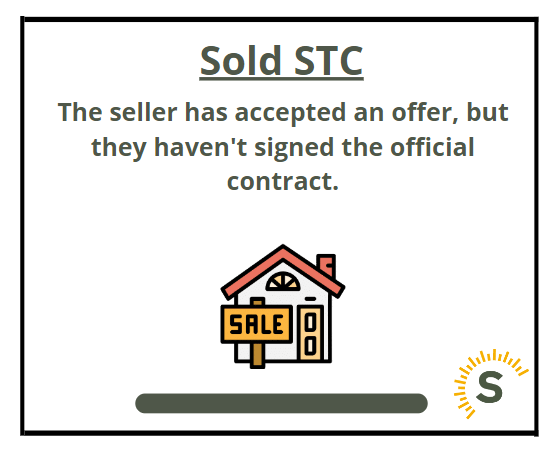
The property market can often be confusing, with industry terminology that can be hard to follow. One such term that often causes confusion is 'Sold STC'.
In this insight, we'll delve deep into the Sold STC Meaning, explaining what it signifies, its implications for buyers and sellers, and the potential pitfalls to be aware of.
'Sold STC' stands for 'Sold Subject To Contract'. It means that an offer has been accepted by the seller, and the estate agent has partially removed the property from the open market, but it is not legally binding as exchange of contracts hasn't happened yet.
At this stage of the purchase, there has been no exchange of contracts.

**** 4.2

Yes, you can make an offer on a house marked "Sold Subject to Contract" (STC). This term indicates that both the seller and buyer intend to proceed with the deal. It's possible to submit an offer during this phase of the transaction.
If the property has not been fully withdrawn from the listing board or site, it could mean that the seller would welcome new offers. However, if you are serious about buying the property you will need to submit a compelling offer.
Yes, you can view homes that are marked as "SSTC" (Sold Subject to Contract) if the seller agrees. However, it can be risky for the seller. If the current buyers discover that you're still showing the property after accepting their offer and investing in legal fees and surveys, they may become unhappy and back out of the deal. It's important to consider the potential consequences before allowing new viewings.
Before a property is marked as 'Sold STC' (which means 'Sold Subject to Contract'), the estate agent does several important checks and processes. These include:
The estate agent makes sure that the seller agrees to the buyer's offer, usually through email.
The names and contact details of the buyer's and seller's solicitors who handle the legal aspects of the sale are confirmed.
An approximate date for exchanging contracts and completing the sale is determined.
The estate agent verifies the HM Land Registry number of the property.
The estate agent finds out if the buyer is part of a chain (connected to other property sales/purchases) and at what stage those other transactions are in the conveyancing process.
The estate agent checks which lender the buyer is using for their mortgage and ensures they have a valid Decision in Principle or mortgage offer.
The agent confirms the deposit amount the buyer is putting down, and it should match the figure mentioned in the mortgage Decision in Principle.
Any special conditions or potential legal issues related to the sale are communicated to all parties, and everyone agrees to proceed.
It's made sure that the buyer's solicitor has performed the necessary AML checks as required by law.
The estate agent helps the seller send relevant documents to their solicitor for the sale process.
Once these checks are completed, and the sale is in progress, the property is labelled as 'Sold STC' until the sale is fully completed.
After the checks are done, the estate agent or auction house creates a Memorandum of Sale. Then, they take the property off the market, and the actual buying and selling process begins.
Both the buyer and seller hire conveyancers or solicitors to handle the legal aspects of the sale. These professionals communicate with each other and address any questions before preparing the official contracts.
The status of the property is changed to 'Sold Subject to Contract' on websites like Rightmove, Zoopla, and On The Market, as well as on the agent's website. The physical "For Sale" sign outside the property is also updated.
Many buyers also start the process of getting a mortgage. They arrange for a RICS survey and take care of other related tasks, which are managed by the solicitor, estate agent, and mortgage broker.
After usually around 2 to 6 months, both parties sign and witness their respective contracts, and the sale is completed. The estate agent then updates the property status to 'Sold'.
'Sold STC' and 'Under Offer' might sound similar, but they have important differences.
When a property is marked as 'Sold STC,' it means it's not available for purchase anymore, but the seller can still technically consider other offers. However, this rarely happens because usually both the buyer and the seller want the sale to go through as planned.
On the other hand, when a property is marked as 'Under Offer,' it means the seller hasn't officially accepted the offered price yet. Even though many buyers and sellers might think the deal is closed, the agent can still receive other offers during this time. The property is 'Under Offer' while the seller evaluates the offers. Once all the necessary checks are completed, and the seller is satisfied with the final offer, the property status can be changed to 'Sold STC' to show that the sale is now proceeding.
Although both parties usually want things to go smoothly, a series of issues can occur during the transaction that results in either the seller withdrawing completely or the property returning to the market.
These issues can include problems with the conveyancing process, mortgage down valuation, issues with the home survey, issues with the conveyancing searches, and complications arising from the property being in a chain.
To sell a house successfully, everyone involved needs to work together and be proactive. This includes the buyers, sellers, solicitors, mortgage brokers, and the estate agent. To speed up the sale process, it's crucial to avoid potential problems.
For sellers, they can help by registering with the conveyancer (the legal expert) early on, filling out the required forms quickly, and making sure the estate agent has done all the necessary checks on potential buyers.
For buyers, they can make the process faster by choosing an experienced and efficient conveyancer, instructing them in advance, and being available to address any issues that may come up during the sale. Being responsive and prepared can help move things along smoothly.
If someone makes a higher offer than the agreed price, it's called "gazumping." This is seen as unfair because it can cause the original buyer, who might have already spent money on legal and surveying fees, to lose out on the property.
If the original buyer is not moving forward with the purchase, the seller might consider other offers. Estate agents keep a list of potential buyers who have shown interest in the property as a backup plan in such cases.
Knowing Sold STC meaning and how the process works is really important for anyone involved in buying or selling a property. When a property is marked as 'Sold STC,' it means the buyer and seller have agreed on the price, but the sale isn't officially confirmed by the law yet.
This stage can be tricky because there are potential problems that may arise, but it also gives both sellers and buyers a chance to double-check everything and make sure they're making the right choice. With the right information and help from professionals, you can successfully navigate the journey from 'Sold STC' to the final completion of the sale.
For more property terms, read:

Stuart is an expert in Property, Money, Banking & Finance, having worked in retail and investment banking for 10+ years before founding Sunny Avenue. Stuart has spent his career studying finance. He holds qualifications in financial studies, mortgage advice & practice, banking operations, dealing & financial markets, derivatives, securities & investments.





Our website offers information about financial products such as investing, savings, equity release, mortgages, and insurance. None of the information on Sunny Avenue constitutes personal advice. Sunny Avenue does not offer any of these services directly and we only act as a directory service to connect you to the experts. If you require further information to proceed you will need to request advice, for example from the financial advisers listed. If you decide to invest, read the important investment notes provided first, decide how to proceed on your own basis, and remember that investments can go up and down in value, so you could get back less than you put in.
Think carefully before securing debts against your home. A mortgage is a loan secured on your home, which you could lose if you do not keep up your mortgage payments. Check that any mortgage will meet your needs if you want to move or sell your home or you want your family to inherit it. If you are in any doubt, seek independent advice.